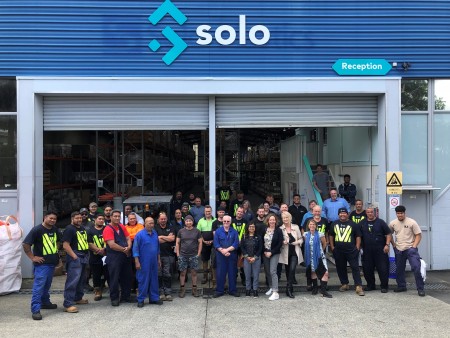
16 June 2021
It was a simple online survey that led Solo Plastics’ CEO Alan Sutcliffe to discover many of his production staff were struggling with digital literacy, language and unable to use a computer.
“Only around five per cent of staff returned our questionnaire and when I asked why no-one was filling the form out, it turned out that many had limited digital skills and most had little experience using computers. There were also challenges around English language skills to understand the questions. At the same time, we were about to implement some automation in the factory meaning staff would have to use computers more and more, so we made the decision to pause that rollout and instead focus on how to upskill our staff in English, numeracy, digital literacy, and leadership,” says Alan.
At the same time, Competenz Workforce Development Business Partner Debs Wand was finding that, through the course of some manufacturing qualifications, many learners were struggling with their literacy and foundation skills. This led Debs to partner with workplace training providers Upskills and Jupiter Training to create bespoke literacy training to run alongside existing workplace qualifications.
“There is no standard training programme,” says Debs. “Upskills and Jupiter Training design programmes that are tailored to the employer, often including the type of documentation or machinery employees or trainees will encounter in their work.”
Solo Plastics is an Auckland-based company that designs, manufactures, and installs pipe and fittings for infrastructure projects including water, wastewater, and electrical industries. Among its 70 staff are two Competenz apprentices and the first literacy training programme saw 20 staff take part.
“The aim was to increase the team’s knowledge and motivate them to own their processes, accept new technology, and to give them confidence to speak up and suggest ideas. The course was taught at their pace and absolutely delivered – the feedback and morale boost has been amazing, and we now have 10 people enrolled on a second, more advanced course and three on a leadership course.”
“The intangible benefits are obvious,” says Alan. “Staff morale is vastly improved as not only do they see an investment from the company in them, they see development in themselves.”
Upskills has always had a strong connection with the manufacturing sector. “What we are seeing is the creation of a learning pathway where participants might firstly upskill their general literacy and numeracy, then as a workplace programme matures, the drive for recognised industry qualifications becomes desirable and achievable with an embedded literacy and numeracy approach. Our relationship with Competenz continues to evolve to ensure we are meeting the learning and development needs of the sector,” says Upskills director Sarah Balfour.
Jeff Tufnell from Jupiter Training has been working with Competenz for the past 20 years and delivers the literacy programme at Solo in conjunction with Upskills.
“Upskills provides a lot of the NZQA and unit standards translation which helps me to deliver the learning that is more focused on workplace outcome. Most of the challenges in manufacturing industry training are around translation and language. At Level 2, most are competent at demonstrating skills, but often have difficulty explaining what they do and interpreting NZQA questions. Our bespoke training programmes can include numeracy, literacy and digital learning, depending on the technology or information systems each company utilises,” explains Jeff.
Alan says seeing his team grow in terms of confidence and spirit has been “the greatest reward”.
“We hope to continue this training for as long as possible. Competenz has been fantastic throughout the whole process and we are currently working with them on setting up a new nationally recognised NZQA qualification in Plastics Fabrication, so our whole industry can work towards a common standard.”
Debs says combined literacy/workplace qualification training is a great way for employers to reward and recognise their staff and being tailored to each company, training sessions can fit around production scheduling.
“Employers tell us that this training has resulted in increased staff engagement, greater productivity and more autonomous decision making. For the learners, they achieve a nationally recognised qualification, increased confidence and better communication skills. Ultimately it results in more enjoyment at work.”
Learn more about upskilling your staff here.



